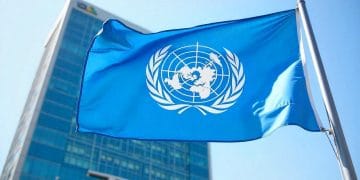The United Nations Conference on Trade and Development (UNCTAD) has called on the United States to exempt the world’s poorest and smallest economies from recently proposed “reciprocal” tariff increases, warning that such measures could cause significant economic disruption without providing clear benefits to US trade policy.
In a report released Monday, UNCTAD identified 28 countries that would be subject to tariff rates above the US’s current 10% baseline, despite each contributing less than 0.1% to the overall US trade deficit. These include nations such as Laos, Mauritius, and Myanmar, with proposed tariff rates of 48%, 40%, and 45% respectively.
The tariffs were introduced as part of a broader strategy by former President Donald Trump, who has argued that they are necessary to counteract what he has characterized as long-standing unfair trade practices by other nations. The administration has stated that the goal is to establish a more balanced and reciprocal global trading environment.
However, UNCTAD noted that many of the affected countries are small, with limited export capacity, and unlikely to pose a competitive threat to the US economy. In its analysis, the agency suggested that these nations are unlikely to significantly increase imports from the US, even if they reduce their own tariffs in response.
For instance, in 2024, Malawi imported $27 million in US goods, Mozambique $150 million, and Cambodia $322 million. Despite facing tariff rates of up to 49%, the total revenue expected from these countries would account for less than 1% of overall US tariff income, according to UNCTAD estimates.
The report also emphasized that many of these countries primarily export agricultural commodities that are difficult to substitute or produce domestically in the US. Madagascar, for example, which faces a proposed 47% tariff, is a key exporter of vanilla to the US market, while Ghana and Ivory Coast supply cocoa valued at $200 million and $800 million respectively.
UNCTAD suggested that higher tariffs on such products would likely lead to increased costs for US consumers without delivering significant benefits to American industries.
The US government paused implementation of the higher tariffs for 90 days earlier this month, following volatility in global financial markets. A 10% base tariff remains in effect during this period, while negotiations continue.
“This pause presents an opportunity to reassess how small and vulnerable economies – including least developed countries – are treated,” UNCTAD said in its report. “This is a critical moment to consider exempting them from tariffs that offer little to no advantage for US trade policy but risk causing serious economic harm.”
Several of the countries affected by the tariff proposal had previously benefited from the African Growth and Opportunity Act (AGOA), a US trade initiative launched in 2000 to support sub-Saharan African economies through duty-free access to American markets. Up to 32 countries were eligible under the program before the latest tariff measures were announced.
Markets and manufacturers in developing regions continue to respond to the evolving US trade stance. Over the weekend, President Trump appeared to revise a previous statement regarding tariff exemptions for certain high-tech products, such as laptops, adding further uncertainty to the administration’s trade policy direction.
Explore top supply chain news stories at The Supply Chain Report. Visit ADAMftd.com for free international trade tools.
#UNTradePolicy #USTariffs #LeastDevelopedCountries #GlobalTrade #TradeExemption #TariffReform #InternationalRelations

















